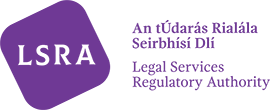Barristers’ Anti-Money Laundering Obligations
The LSRA is the competent authority for all barristers in relation to anti-money laundering obligations. On this page you will find out about barristers’ obligations under the Criminal Justice (Money Laundering and Terrorist Financing) Act 2010, as amended (Act). While practising barristers are “designated persons” under the Act, the obligations under the Act only apply where the barrister acts as a “relevant independent legal professional”, as defined in the Act.
Guidance for barristers
About the Criminal Justice (Money Laundering and Terrorist Financing) Act 2010 (Act), as amended and its applicability to barristers engaged in certain types of work.
The LSRA is the competent authority under the Criminal Justice (Money Laundering and Terrorist Financing) Act 2010 (Act), as amended, for all barristers. This means barristers who are members of the Law Library and barristers who are not members of the Law Library.
The role of a competent authority includes effectively monitoring barristers, as designated persons, and taking measures that are reasonably necessary for securing compliance with the provisions of the Act.
Purpose of this guidance
This guidance is provided as part of the LSRA’s overall role as a competent authority under the Act. It is intended to provide general information for all barristers to support and assist them in complying with their obligations.
It is the responsibility of each individual practising barrister to comply with the Act.
Where obligations under the Act arise relating to a business risk assessment, a designated person is required to have regard to any guidance on risk issued by the LSRA.
* The information provided here is intended as guidance only, is not exhaustive and does not purport to be legal advice or to provide a legal interpretation of the Act. Barristers are encouraged to familiarise themselves with the Act and to satisfy themselves that they are in compliance with the Act.
This guidance is up-to-date as of 11.03.2024. This information is subject to change.
Background Information
Barristers’ AML Obligations
Other Resources
AML Secure Channel
The Criminal Justice (Money Laundering and Terrorist Financing) Act 2010 (as amended), (the “Act”) provides that practising barristers, as designated persons under the Act are legally obligated to report suspicious transactions as is more specifically set out in the Act. It is vital that all practising barristers inform themselves of their respective obligations and importantly appropriate means of reporting suspicious transactions as is clearly set forth in the Act.
In accordance with the Act, the LSRA has established a secure communications channel to encourage additional reporting of potential and actual breaches of the Act. This secure communications channel can also be used to report threats of retaliatory or hostile action resulting from the reporting of suspected breaches and any AML specific and sensitive queries any practising barrister may have with regard to their AML obligations. It is important to note that this secure channel does NOT replace the required reporting channel as set out in the Act and the LSRA cannot and does not provide legal advice to barristers with regard to their AML obligations.
The secure channel is accessible through the email address [email protected] and is a confidential and secure communication channel in which practising Barristers can report issues of AML compliance directly to the LSRA.
For the purpose of emphasis, the use of the LSRA secure communications channel does not obviate or remove any obligation whatsoever upon practising barristers to independently comply with any and all applicable provisions of the Act or related Acts. While the LSRA provides detailed information to practising barristers on their independent AML obligations, the LSRA cannot and does not provide legal advice to practising barristers on their obligations pursuant to the Act.
Non-exhaustive list of other resources
- National Risk Assessment on Money Laundering and Anti-Terrorist Financing, April 2019
- The Financial Action Task Force (“FATF”) is an intergovernmental body that sets standards and promotes implementation of legal, regulatory and operational measures for combating money laundering and terrorist financing. Please see FATF Risk Based Approach Guidance for Legal Professionals (26 June 2019)
- amlcompliance.ie (Department of Justice, Home Affairs and Migration ).
Sanctions (Restrictive Measures) Imposed on Russia and Belarus over Ukraine
The EU has imposed a number of further sanctions on Russia and Belarus on foot of the Russian invasion of Ukraine on 24 February 2022.
The LSRA has produced a guidance document as part of its role as the competent authority for all barristers in relation to anti-money laundering obligations, and as part of the LSRA’s role in receiving and investigating complaints of alleged misconduct in respect of legal practitioners.
The guidance sets out legal practitioners’ obligations in respect of the new EU sanctions on Russia and Belarus.
